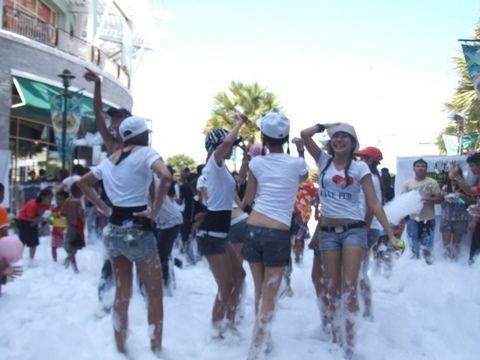Songkran Festival Water Fight! Thailand Style
Songkran Festival
Water Fight! Thai Style

Thailand is well known for being laid-back and Thai people are often generalized as fun-loving and playful. These couldn’t be truer or blatantly obvious than on the upcoming Songkran holiday. Songkran is a three-day, national holiday. The origins go back hundreds of years and many of the traditions are still practiced today. However, it has evolved through time and has now become synonymous with being the World’s Largest Water Fight! Anyone who has traveling plans between 13-15 April, is well advised to get an early start, or travel in a closed vehicle. Pretty much the only ones safe from a full-soaking are monks.
The word Songkran comes from Sanskrit and means “to pass” or “move into.” Since the traditional Thai calendar was solar based, Songkran was originally celebrated when the sun began its journey north. For the last hundred years or so, the date has been fixed on the 13-15 of April. Until 1940, this was the one, true Thai New Year. At that time, they adopted 1 January to match the western business practices and Songkran became a national holiday. Not only are all government facilities closed during this time, but nearly all non-essential services take a three to seven day holiday as well.
Historically, Songkran was a time to pay respects to one’s elders and perform rituals designed to cleanse oneself of any mistakes or wrongdoings in the past. Gradually, the act of cleansing Buddha images came into practice. People would gently douse statues from area temples and their homes with rose-scented water. Soon after, people started collecting the ‘blessed water’ after it has passed over the various statues and would then gently pour this water on the shoulders of village elders and monks. Given the extreme heat, the near total dryness during April, and Thai’s affinity for having a good time, it was only a matter of time before the water was showered over anyone within arm’s reach.

Another common site during the festival is people smearing ground chalk or powders on other’s faces. This practice is derived from ceremonies carried out by monks which use chalk to bless various objects and people. Some traditionalists don’t care for what Songkran has become, but most Thais see the changes as just the way things go sometimes and also just really love having a good time. To avoid conflicts of interest or disruptions on either side, many places begin the traditional peaceful cleansings during the afternoon of the 12th, or just earlier in the day on the 13th.
Most of the partying and larger water fights begin in the early afternoon and start winding down as the sun sets. Just because the sun has gone down doesn’t, by any means, imply the party’s over. Most revelers take this time to head home, take an ironic shower before dinner and then head out for long nights of festivities of a drier sort.
Whenever large festivities are held, there is usually a fair amount of drinking involved, as well as a tendency for more reckless behavior. These elements combined can and do lead to a worrying number of fatalities each year. But with a bit of foresight, common sense, a heart full of sa-nook and an attitude of sa-bai sa-bai, it’s not difficult to have a fantastic and safe Songkran.